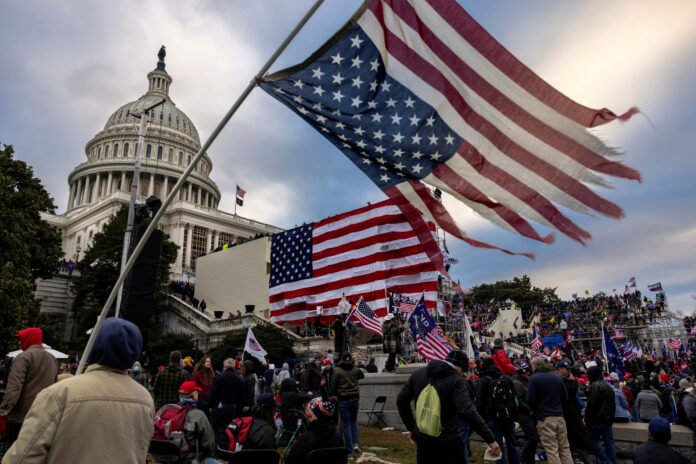Mike Johnson’s selection as the speaker of the House has brought new scrutiny about his role in objections over the Electoral College vote in 2020, and what he may do in 2024.
Johnson was not only one of 147 Republicans objecting to electoral votes on Jan. 6; he was a leader in the effort. He wrote a letter urging fellow Republicans to sign on to a case brief seeking to throw out election results in four battleground states. He was one of the most ardent supporters of the “rigged election” narrative, including claims about “rigged” Dominion voting machines and Venezuelan interference in the election. His claims mirrored those spread by Sidney Powell, Kenneth Chesebro, and Jenna Ellis–all of whom have taken plea deals to avoid jail time for their roles in trying to subvert election results in Georgia. Johnson has even been called the “mastermind” behind the Electoral College plot in Congress.
Elevating Johnson to the speakership reveals how strong former President Donald Trump’s clutch is on the Republican Party. Trump continues to be the favored candidate and election denialism has become a litmus test of sorts within the party. When asked about Johnson’s role in trying to overturn the results of the 2020 election, many Republican House members booed and one told the reporter to “shut up.” This has led many to question what, if anything, Johnson and House Republicans might be able to do to disrupt the counting of electoral votes in 2025.
Most of the time, the process to certify electoral votes in Congress is largely ceremonial and is over in less than an hour. Over the course of American history, the threshold to object to an Electoral College vote has been incredibly relaxed and rarely invoked. Since the passage of the Electoral Count Act of 1887 (ECA) all it took was one member of the House and one member of the Senate to formally lodge an objection. From 1887 to 2020, the ECA was invoked just three times—1969, 2005, and 2021.
In 1968, a North Carolina presidential elector cast his vote for George Wallace instead of Richard Nixon. The objection was defeated and the vote for Wallace was counted. After the 2004 election, House member Stephanie Tubbs Jones and Senator Barbara Boxer cited election irregularities in Ohio and challenged George W. Bush’s electoral votes from the state. Their objection was soundly defeated by both chambers.
Then came 2020, and Donald Trump’s campaign to have Congress and former Vice President Mike Pence reject electoral votes from key battleground states. The events that unfolded that day would become among the most ignominious in America’s history. Trump’s actions resulted in Congress swiftly passing the Electoral Count Reform Act of 2022 (ECRA) with bipartisan support.
Among other things, the ECRA makes clear that the role of the vice president in counting electoral votes is purely ministerial and has no discretion. It also raises the threshold to lodge an objection from just one member in each House to one-fifth of the members in each House. This takes us back to what could happen on Jan. 6, 2025, with a Speaker Mike Johnson.
Win McNamee/Getty Images
The reality is the speaker has little formal role in the counting of electoral votes. This does not mean however, that Johnson may not have influence over that process. As the leader of the Republicans in the House, Johnson’s selection suggests that he would be open to challenges to electoral votes given his past support of Trump’s false claims of election fraud.
One of the arguments emboldening the infamous “Eastman memo” was that the ECA was unconstitutional and could simply be disregarded. While the ECRA was created to prevent future mischief, its mere existence (as seen in Eastman’s approach to the ECA) is not sufficient to prevent overzealous legislators from forcing a constitutional crisis once again. We have already seen what mass objections and calls of fraud have done to faith in the democratic process in the United States. This alone should be of great concern.
Others have suggested that Speaker Johnson could affect the selection of the president under extraordinary circumstances. Election law expert Ned Foley has raised concerns that Johnson could have the House refuse to participate in counting electoral votes, presenting a new constitutional crisis. Law professor Richard H. Pildes has brought up the power Johnson could have if a contingent election occurred where no candidate secured an Electoral College majority, and the House is charged with selecting the president. While unlikely, the events of Jan. 6 were also unimaginable at the time.
Given the fragile state of our democracy, the selection of Speaker Johnson—with his past embrace of the 2020 rigged election narrative—does not bode well for those looking to restore trust in the electoral process.
Robert Alexander is the Wilfred E. Binkley endowed professor of political science and the director of the Institute for Civics and Public Policy at Ohio Northern University. He is the author of Representation and the Electoral College, published by Oxford University Press.
The views expressed in this article are the writer’s own.
Uncommon Knowledge
Newsweek is committed to challenging conventional wisdom and finding connections in the search for common ground.
Newsweek is committed to challenging conventional wisdom and finding connections in the search for common ground.


